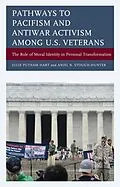Pathways to Pacifism and Antiwar Activism among U.S. Veterans seeks to answer the question of how and why some military personnel become antiwar activists. To examine this, the authors look at the stories of 114 veterans' pathways from a militaristic perspective to either a Just War or pacifist perspective. Identity theory provides a lens for exploring this process. The authors argue that this postservice process of identity transformation is not pathological but healthy, as it offers healing and verification of multiple roles and social aspects of the veterans' lives.
Autorentext
Julie Putnam Hart is associate professor of sociology at Ohio Dominican University. Anjel Stough-Hunter is assistant professor of sociology at Ohio Dominican University.
Zusammenfassung
Pathways to Pacifism and Antiwar Activism among U.S. Veterans seeks to answer the question of how and why some military personnel become antiwar activists. To examine this, the authors look at the stories of 114 veterans' pathways from a militaristic perspective to either a Just War or pacifist perspective. Identity theory provides a lens for exploring this process. The authors argue that this postservice process of identity transformation is not pathological but healthy, as it offers healing and verification of multiple roles and social aspects of the veterans' lives.
Inhalt
Introduction
1. Identity Theory
2. Research Methods
3. The Combat Catalyst of Identity Change
4. The Betrayal Catalyst of Identity Change
5. The Religious Conviction Catalyst of Identity Change
6. The Education Catalyst of Identity Change
7. Comparing Activist Veterans to Non-Activist Veterans
8. Renegotiating Masculinity for Anti-war Veterans
9. Findings
Conclusions and Implications
